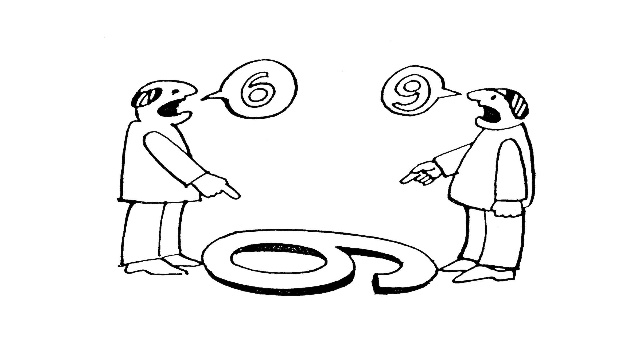I know, I know

One of the most precious events in a young life is learning something exciting. I remember watching my nephew learn how to do a flip off the diving board when he was young. Guided by his compassionate, patient, and visionary dad, there was lots of splashing and smacking the water with skin streaked red as he repeatedly got out of the pool and tried again. His determination was impressive, much more impressive than his first flip, but paled in comparison to his expression when he succeeded. He figured it out through trial and error, lots of error and plenty of trial. The look of satisfaction, contentment, and pride on his face was a gift to witness. He said nothing upon figuring it out, he simply did it again and then grabbed a towel and headed inside. He was complete, fulfilled, successful, and the look on his face will remain in my memory forever. I had an interesting conversation with two very good friends at dinner the other night about the process of learning. They both teach in a manner of speaking, but that doesn’t really begin to capture who they are. A life-long student would be a better description of them both, but in our culture, that makes it sound like they haven’t learned anything. The way they both lit up as they began to describe their love of learning was powerful. Mette talked about her hunger for knowledge when she was in school and how figuring things out was delicious. As she spoke and talked with her hands about how organic chemistry was like playing with building blocks, I could see an image constructing before my eyes with each new piece standing on the trusty foundation of the one that came before it. Learning for her was like detective work, exciting and playful mentally. Linda’s hunger for learning lived in the sole purpose of being able to teach it to someone else, and not just to pay it forward, but to educate and empower through learning, understanding, and knowledge. Not knowing is a priceless place to this duo and the desire to be there is one of the rarest traits around.
One of the biggest barriers to learning is the weak manner in which we evaluate progress. Failure is key to learning, period, and most people just can’t deal with failure. Once someone fails, the kneejerk reaction is to remove success as a possible outcome and many times, they give up. Ever the optimist, Linda began describing how learning becomes a space, a place to dwell to expand the mind, body, or soul. The cynic in me saw our psychological resistance to learning and instantly labeled so many of the people I have tried to teach and the short cut they attempt to take. “People want to jump from not knowing to knowing,” I quipped. “Yes,” says Linda, “that is learning,” as if I didn’t get it. “No,” I insisted, “they want to skip the whole learning part and just know it already,” clearly representing the already knowing it part of the argument. To her, it was all about learning because that is her love and her passion and has been the outline of her career and life. To me, it represented the struggle we all have to embrace not knowing in order to be able to one day know via learning. As I was full of brace and completely inflexible, Linda just flowed with it, no righteousness, no wanting to be in a different place. And Mette, stuck somewhere in between, giggled at how we both were representing our positions so perfectly.
So then how do we know if we are learning? It sounds like a ridiculous question but if you think about it, there is a point in there. Most of the time when we think we are learning we might only be confirming what we already know. You might have heard of “Confirmation Bias” or the deep, dark desire to confirm our already held beliefs…the “see, I told you so” no matter who plays the “you” role. It is human nature to want to be right and confirmation bias is our handiest tool. We take information and adapt it to what we think to be true so that, no matter what, it reinforces our position and our ego remains intact. Learning, on the other hand, requires either finding something we already know to be incorrect, or acquiring new information, which requires admitting we didn’t know that yet. This takes a person with a sense of self that can tolerate not knowing.
There is a growing movement around curiosity (the cover of Harvard Business Review, Sept-Oct 2018) and how curiosity is what sparked all the important inventions of our time. Well, that might be a little drastic, but without the desire to discover, or learn, there is no forward movement. The problem with the HBR story is that most CEO’s say they encourage or even work to foster curiosity (83%) however only 52% of their employees agree. If leaders assume their people are empowered to be curious and not so many agree, where is the gap? Giving someone permission to explore ideas and someone feeling brave enough to do so are two very different ideas. I wonder if not knowing how to not know might be in the way…
This topic is personal for me because I have great difficulty not knowing. You might have picked up on this from my conversation with Linda, but just in case you didn’t, it’s a real problem for me! Perhaps growing up with a genius older brother lended a psychological hand, but whatever the origin of my barrier, it is a thick one. Go ahead and analyze me, I have a Ph.D., the highest academic achievement possible, and that should certainly prove that I know. And I know a lot. I spend time every day reading to increase my knowledge base. And yes, it is to quell whatever makes me think I need to know everything, doctor. There are plenty of people in my life who will tell you I’m smart and plenty more who will tell you I’m a smarty-pants. See, when my intelligence or ability gets threatened, proving how much I know is my auto-pilot to safety for my psyche. Lucky for me, I hang out with amazing people like Mette and Linda, and they teach me to learn. In addition, I had incredible professors in graduate school with equal passion to my dinner mates. One of my favorite courses was a statistics course, and not because it was statistics but because the book for the course was called, “Alternative Hypotheses.” I can’t remember who the author was, but it was more like a booklet than a book, maybe covering 100 pages. It had theory after theory with each one presenting a half dozen possible explanations or alternative hypotheses. I can’t remember one theory or one explanation, but I can remember my professor pressing us hard to look deeper, think longer, and be methodical in our thinking. It was the first time I learned about perspective and how to shift mine.

Being a life-long student does not come naturally to me, nor do I think it does to many other sufferers like me. However, that does not prevent us from learning to learn. Our brains are wired for learning, so it is the mind that gets in the way. I learned this from my horse, actually. If you are not a horse person, hang in there, there is a point here. Horses do not have a giant pre-frontal lobe like humans so abstract thought is not cognitively possible. They, like dogs or cats, cannot really plan ahead, or make up stories, or plot to make your life miserable. But they are wired to learn like humans. The interesting thing about not having a pre-frontal lobe is that the way they evaluate safety and security is cut and dry, no second-guessing if that smiling tiger is dangerous, it is! And they need to feel safe to release the rest of their brain power to be able to learn. So, habit is different than knowledge…but can look really similar. The first time I watched my horse figure out something I was trying to teach him was just like what my nephew looked like on the diving board. Try and fail, try and fail, try and fail and get frustrated, and then try and fail some more. And then, all of a sudden, it clicked, and he learned it. Truth be told, he hasn’t forgotten it no matter how long ago this happened. It was the safety that created the environment for both my nephew and my horse to be able to learn. What I learned from watching them both learn was to recognize that when smarty-pants emerges, there is no learning. Proving how much I know does not exactly equal learning.
It is a constant battle, getting the defenses to fold so I can learn something new. But I have practiced it so much that it is like having coffee with an old friend, you just know what they are going to say. Perhaps the best part of hanging out with Mette and Linda is how compassionate they are with me, even when I am being difficult. Linda knew I was not really listening to her in that moment and she let me ramble on and be “right,” and then when my brace released, she gently helped me see…and learn. Becoming safe, secure, and cared for allowed me to tune in and accept not knowing for a moment. At least I learned to surround myself with excellent teachers! How about you?